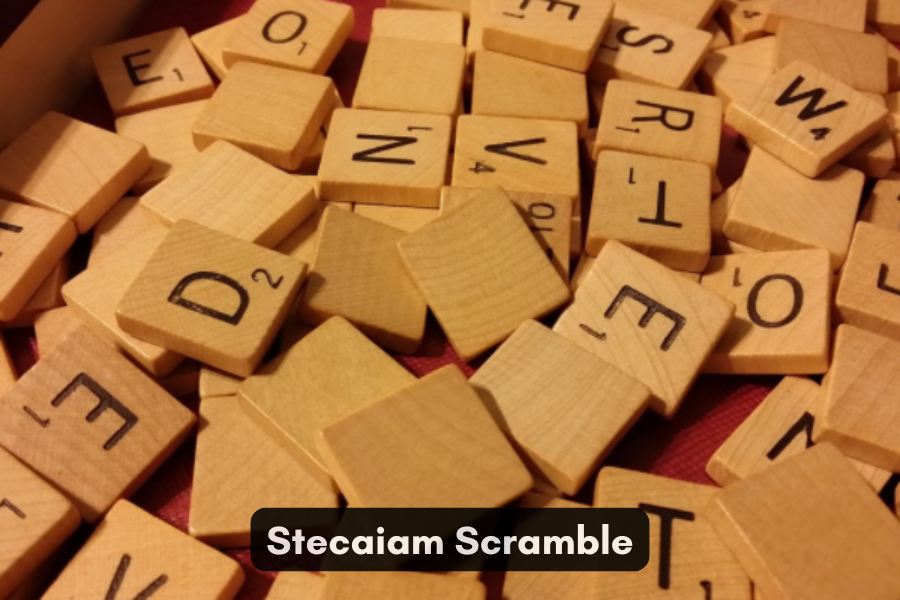
Stecaiam Scramble
What Does “Stecaiam” Represent?
At first glance, “Stecaiam” doesn’t seem to be an actual word in the English language. However, much like other word puzzles, it provides an exciting chance to rearrange its letters and uncover meaningful words. By unscrambling these letters, multiple relevant terms appear, each holding its own unique definition and significance. Let’s dive into some of the words that can be created from the letters of “Stecaiam.”
Words Derived from “Stecaiam”
From the mixed-up letters of “Stecaiam,” a variety of meaningful words can be generated. These words not only spark curiosity but also offer valuable insights into different fields, ranging from societal issues to the natural world and beyond. Below are several words that emerge from this letter scramble:
1. Casteism
Casteism refers to a societal system that divides people based on caste, often resulting in discrimination and inequality. This practice has historically led to significant social and economic disparities, particularly in regions like South Asia, where the caste system is deeply entrenched.
The concept of casteism is tied to the negative consequences of caste-based discrimination, which still persists despite efforts for reform. This ongoing issue contributes to inequalities in education, employment, and social mobility. Understanding casteism is essential to recognizing broader social justice challenges and advocating for fairness in society.
2. Statice
Statice, also known as Limonium, is a genus of flowering plants in the Plumbaginaceae family. These flowers are particularly famous for their striking hues and long-lasting blooms, making them highly popular in both fresh and dried floral displays. Native to coastal regions of Europe, Asia, and North Africa, statice thrives in areas with well-drained soil and abundant sunlight.
In floristry, statice holds significant value due to its durability. It’s frequently included in flower arrangements for special events, including weddings and memorial services. Alongside its aesthetic charm, statice is symbolically linked to ideas like remembrance, lasting beauty, and success. Its long lifespan also makes it an ideal candidate for dried flower arrangements.
3. Attics
An attic refers to the space beneath a building’s roof, typically used for storage. Architecturally, attics can serve various purposes depending on their layout and size. Initially designed to house seasonal items and household goods, many people now transform attics into livable spaces, such as extra bedrooms, home offices, or recreational rooms.
The adaptability of attics makes them a valuable asset for homeowners. With proper insulation, lighting, and ventilation, attics can be converted into usable areas that increase a home’s overall livable square footage. Additionally, attics are commonly used to store personal items that aren’t needed on a daily basis, like old furniture or keepsakes.
4. Static
The word “static” describes something that remains motionless or unchanged. In physics, “static” is used to refer to forces, charges, or fields that involve no movement, such as static electricity. This phenomenon occurs when an imbalance of electric charges builds up on the surface of materials, often leading to sparks or mild shocks when touched.
In addition to its scientific use, “static” is frequently used in everyday situations. For example, “static noise” refers to interference in audio systems that distorts sound quality. On a more metaphorical level, when someone describes a situation as “static,” they are implying that it is stagnant or not evolving, suggesting a lack of progress or change.
5. Mistic (A Variation of Mystic)
Though “mistic” is not formally recognized as an English word, it closely relates to “mystic.” A mystic is an individual who seeks direct interaction with the divine or higher powers through meditation, spiritual practices, or contemplation. Mysticism is a central element in many religious traditions, such as Christianity, Hinduism, and Buddhism, focusing on spiritual experiences that go beyond rational understanding.
The practice of mysticism is often associated with deep spiritual insight. Mystics seek a connection with the divine that transcends normal, everyday experiences. These profound experiences of transcendence and enlightenment have influenced various art forms, literature, and religious practices, leaving a lasting mark on spiritual and cultural landscapes.
6. Matics
While “matics” doesn’t stand alone as a word, it forms part of important terms like “mathematics.” Mathematics is a crucial field that studies numbers, quantities, shapes, and patterns, and it is integral to both scientific inquiry and daily life. It provides the tools needed for solving problems and understanding complex systems.
Mathematics is foundational not only in technical fields like engineering and economics but also in fostering critical thinking and problem-solving abilities. It equips individuals with logical reasoning skills, which are invaluable in various real-world scenarios.
Cognitive Advantages of Word Scrambles
Engaging in word scramble puzzles goes beyond simple entertainment—it stimulates several cognitive functions. When solving puzzles like the “Stecaiam Scramble,” the brain gets a workout, enhancing different mental capabilities, including:
- Vocabulary Growth: Decoding scrambled words often introduces players to new vocabulary, broadening their language knowledge.
- Enhanced Spelling: Word scrambles reinforce spelling by requiring players to rearrange letters into proper word formations.
- Memory Improvement: The act of recalling words and their meanings helps enhance memory retention.
- Problem-Solving Enhancement: Word games foster critical thinking as players devise strategies to form valid words from the scrambled letters.
- Heightened Attention to Detail: Successful word unscrambling demands close attention to each letter, sharpening concentration and focus.
The Learning Benefits of Scrambling Words
Word scrambles aren’t only enjoyable—they serve as useful educational tools. They can significantly improve language skills, mental abilities, and problem-solving techniques for learners of all ages. Educators and language instructors frequently use word scrambles in classrooms as an engaging approach to reinforce vocabulary, spelling, and language acquisition.
Moreover, word scramble activities can be highly effective for language learners. By unscrambling foreign words, students can deepen their understanding of vocabulary and grammar, enhancing their overall language proficiency.
Online Resources for Unscrambling Words
For those who enjoy the challenge of word scrambles, several online resources can assist in solving these puzzles. Websites such as WordFinder and Unscramble let users enter scrambled letters and generate a list of possible words. These tools are not only valuable for casual players but are also beneficial for students and language learners seeking to expand their vocabulary and grasp of word formation.
Real-Life Applications of “Stecaiam” Words
The words created from the “Stecaiam Scramble” are not only fascinating in the context of a puzzle but also have practical applications in various aspects of life:
- Casteism: This term is crucial for understanding social issues, particularly in regions like South Asia, where caste-based discrimination remains a widespread problem.
- Statice: This resilient flower plays a significant role in the floral industry and is used symbolically for occasions such as weddings and memorial services.
- Attics: Renovating an attic can add valuable space and increase a home’s worth, making it a popular option among homeowners.
- Static: Static electricity is a key concept in scientific fields like electronics and physics, and it’s essential in understanding electric charges and fields.
- Mysticism: Mysticism continues to shape spiritual practices, influencing art, personal beliefs, and religious traditions.
By analyzing the words formed from “Stecaiam,” we can gain meaningful insights into language and explore a wide range of cultural, scientific, and social concepts.
Key Facts
Origin of the “Stecaiam Scramble”:
The term “Stecaiam Scramble” originates from a jumbled set of letters that can be rearranged to form meaningful words. The challenge lies in deciphering these letters to uncover a series of relevant and insightful terms.
Cognitive Benefits:
Engaging with the “Stecaiam Scramble” helps improve cognitive functions such as problem-solving, memory, attention to detail, and language skills. It encourages critical thinking by requiring players to find various valid words from a scrambled set of letters.
Words Formed from “Stecaiam”:
When unscrambled, the letters in “Stecaiam” form a variety of meaningful words, including terms like “casteism,” “statice,” “attics,” “static,” “mistic,” and “matics.” These words cover diverse topics such as social issues, floriculture, architecture, science, and spirituality.
Educational Value:
The “Stecaiam Scramble” can serve as an educational tool, helping learners expand their vocabulary, improve spelling, and develop problem-solving skills. It’s often used in classrooms to reinforce language and cognitive abilities.
Real-World Relevance:
Many of the words derived from “Stecaiam” have real-world applications. For instance, “casteism” is central to social justice issues, “statice” is significant in floristry, and “attics” are often used in architecture and home renovation.
Enhanced Attention and Focus:
The puzzle requires players to focus and pay close attention to detail as they work to unscramble the letters. This attention to detail helps boost concentration and mental sharpness.
Language and Problem-Solving Skills:
Working with scrambled words, like in the “Stecaiam Scramble,” fosters both language acquisition and problem-solving skills. This is especially beneficial for learners studying new languages or those trying to enhance their critical thinking.
Symbolic Meaning:
The process of unscrambling letters in the “Stecaiam Scramble” can also carry symbolic meanings. The challenge of sorting out the confusion and finding clarity mirrors the real-life process of resolving issues and understanding complex concepts.
Versatility of the Game:
The game appeals to a broad audience, from casual players looking for a fun challenge to educators seeking engaging ways to teach language and vocabulary.
Conclusion
In summary, the “Stecaiam Scramble” is more than just an enjoyable puzzle. Rearranging its letters reveals a variety of meaningful words that touch on a broad array of topics, including social issues, nature, architecture, and spirituality. Each word holds significance in its respective domain, enriching our understanding of both language and the world around us. Word scrambles like “Stecaiam” not only help develop cognitive skills such as problem-solving, memory, and focus, but they also foster a deeper appreciation for the intricacies of language. Whether used as a fun challenge or an educational tool, unscrambling words remains a valuable activity for individuals of all ages.
FAQs
What is a word scramble?
A word scramble is a puzzle in which the letters of a word are mixed up, and the goal is to rearrange them into a meaningful word or phrase. It’s a fun and engaging activity that promotes vocabulary, spelling, and cognitive development.
What words can be formed from “Stecaiam”?
Several meaningful words can be formed from “Stecaiam,” including “casteism,” “statice,” “attics,” “static,” “mistic,” and “matics.” These words have significance across various fields such as social issues, floriculture, architecture, science, and spirituality.
How does solving word scrambles benefit the brain?
Solving word scrambles enhances cognitive functions like vocabulary expansion, spelling, memory retention, and problem-solving. It also boosts attention to detail and sharpens focus and concentration.
Can word scrambles be educational?
Yes, word scrambles are an excellent educational tool. They help students improve language skills, reinforce spelling, and encourage vocabulary development. They also make learning more interactive and enjoyable.
Are there tools to help with word scrambles?
Yes, online tools such as WordFinder and Unscramble assist in solving word scrambles. These platforms allow users to input scrambled letters and generate possible words, making them useful for both casual players and language learners.
Keep an eye for more latest news & updates on The Washington Vibes!





